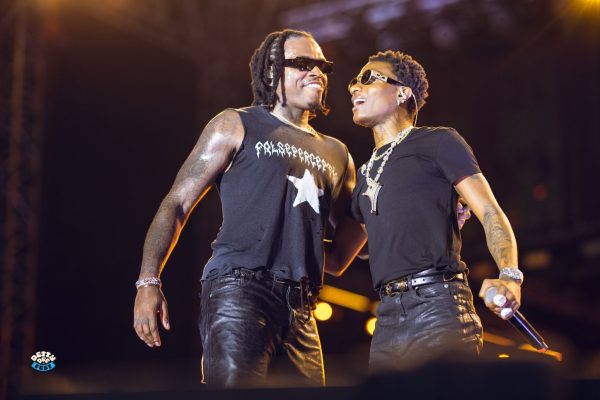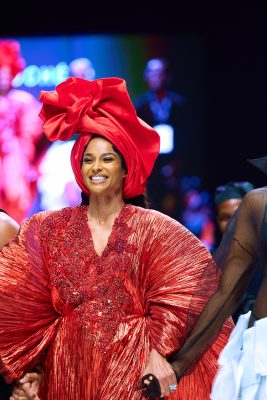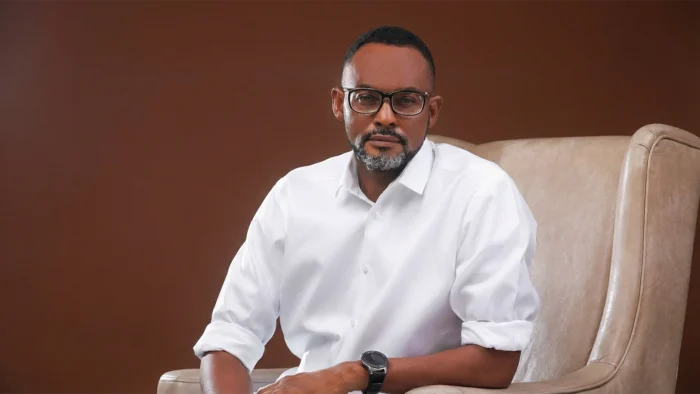It is not all the time you find a simple, intelligent, coming-of-age tale elevating its visuals into a deeply humanist narrative. My Father’s Shadow pulls off this feat. With a simple structure, the British-Nigerian filmmaker, Akinola Davies Jr., makes a strong directorial debut.
His deft and intriguing tale of an absent father briefly reunited with his two young sons offers a heartrending, visually engaging account of an average young man who demanded for nothing other than to be the father he wants to be.
The film debuted at the Cannes Film Festival to awestruck acclaim, and went onto be chosen as the first Nigerian feature in the festival’s Official Selection (Un Certain Regard) and received the Caméra d’Or Special Mention.
In My Father’s Shadow, the director packs every scene with wit, visual flair, and telling personal details. He keeps revealing key fragments with close ups. The genius of the film is that all of these miscellaneous elements add something vital to the production.
The film, written by brothers, Akinola and Wale Davies, and directed by the former, spans one day in the life of two young boys traveling with their father from a small village in rural Nigeria to the bustling capital city Lagos.
Sope Dirisu, best known as the lead in Gareth Evans’ Gangs of London, Apple TV’s Slow Horses and recently wrapped Scott Derrickson’s feature film The Gorge, as well as credits in romantic drama, Mr. Malcolm’s List and the Netflix horror His House, which earned him BAFTA and BIFA nominations, comes to play Folarin.
It’s a moving account of how, just for one day, two young boys glimpse the real life and real history of their father who has been mostly absent for much of their lives – and how they come to love and understand him just at the moment when they come to see his flaws and his weaknesses.
Set in 1993, the year of the country’s freest and fairest election, the first since a military takeover 10 years previously, the film echoes the disorder that takes over the country owing to the presidential election.
In their remote village far from Lagos, two young boys, Remi and Akin, played by Godwin Chimerie Egbo and Chibuike Marvelous Egbo, as shown in opening scenes, have a playful, antagonistic relationship with each other, as most brothers close in age do.
They are awed at the sudden reappearance of their father, Folarin, who makes no explanation or apology for having been away for so long or for turning up now unannounced. However, their bond is deepened by mutual admiration for their father. That’s immediately evident in the way their manner becomes quieter and more reserved when they are around him.
Their father demands to know what has happened to his watch, whether the boys have been touching his possessions in the bedroom. Later, he announces he must return to Lagos immediately, without waiting for his wife to return from shopping.
Folarin is on a desperate mission to reclaim four months’ worth of unpaid wages before what he clearly expects will be a complete breakdown of law and order connected with this election.
What happens next is an increasingly significant quest and bonding experience for father and sons as they struggle to get to the capital on a bus with no petrol, and then by hitching a bumpy ride on a truck.
The boys watch with bewildered quiet as their father greets men they have never seen before and who nickname Folarin ‘kapo’ or ‘boss’ – and they are commanded to greet a quasi-uncle with much politeness – yet the exact person who can get Folarin his money is never around. He is under pressure, subdued, suffering unexplained nosebleeds. Yet this frustrating delay gives the three of them a kind of breathing space to get to know each other.
Folarin points to the beautiful National Theatre building where he says their mother used to spend all her time and money as a young woman. He points out polo ponies in the street, belonging to Nigeria’s wealthy classes. He also takes the boys to a bar where he regales them with magical memories of falling in love with their mother – but also exchanges significant looks with a waitress.
He takes them to the beach where he talks about the importance of providing for your family: that is what a man does, and it is what he himself has to do, with these unpaid wages, right now. And all the time, the boys are struck by the thousands of people and the thousands of faces they see.
Shot on 16mm guage using state of the art technology, My Father’s Shadow serves as a visual archive of Nigeria’s history. Its groundbreaking success at Cannes and with critics is history being made in real time. This is a watershed moment in Nigerian cinema and the Nigerian premiere will set the tone for global rollout.
It’s a portrait of memory, identity, fatherhood and nationhood. It hopes to encourage Nigeria and Africa’s creatives to be limitless in their vision. It shows homegrown stories can compete on the world stage without sacrificing their roots.
The film’s glowing reception demonstrates how globally exportable Nigeria’s culture can be. Its success is a testament to Nigeria’s wealth of skill, creativity, and technical expertise.
Funmbi Ogunbanwo, a Sundance winning producer, BAFTA nominee, and cofounder and CEO of Fatherland, was the first Nigerian woman to produce a film officially selected at the Cannes Film Festival, where My Father’s Shadow received a Caméra d’Or Special Mention.
A member of the Producers Guild of America and former commissioning editor at MultiChoice, Funmbi is focused on building the ecosystem behind the screen, nurturing homegrown talent and architecting new possibilities for Africa’s creative industries.
Akinola, a Cannes winning director, BAFTA nominee, and Sundance Award recipient, known for his visionary approach to storytelling, directed Lizard, which won the Sundance Grand Jury Prize.
Akinola’s filmmaking blends cinematic craft with spiritual, social, and cultural inquiry, a style informed by his background across visual art, fashion, and music.
Wale is a Grammy award winning producer, Sundance winning screenwriter, and BAFTA nominated multi-hyphenate, whose writing anchors some of Fatherland’s most defining work. He co-wrote and produced Lizard, the first Nigerian short to win at Sundance, and My Father’s Shadow, the first Nigerian feature to screen in Cannes’ official selection.
The Egbo brothers, discovered through a street casting initiative by Fatherland Productions, bring a quiet strength and focus beyond their years. Their bond as brothers translated beautifully to screen, allowing them to access moments of tenderness, vulnerability, and truth that lie at the heart of My Father’s Shadow.








